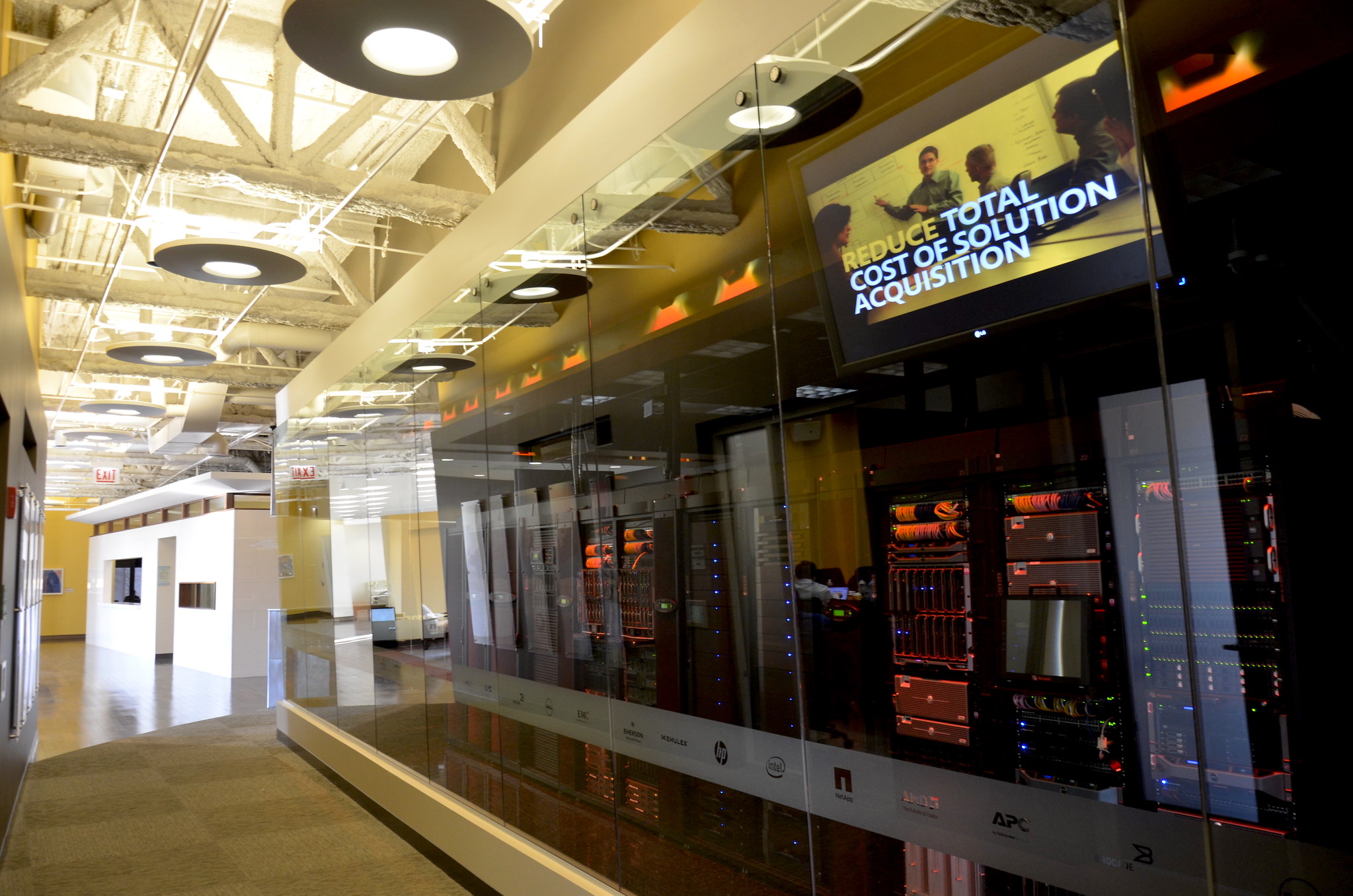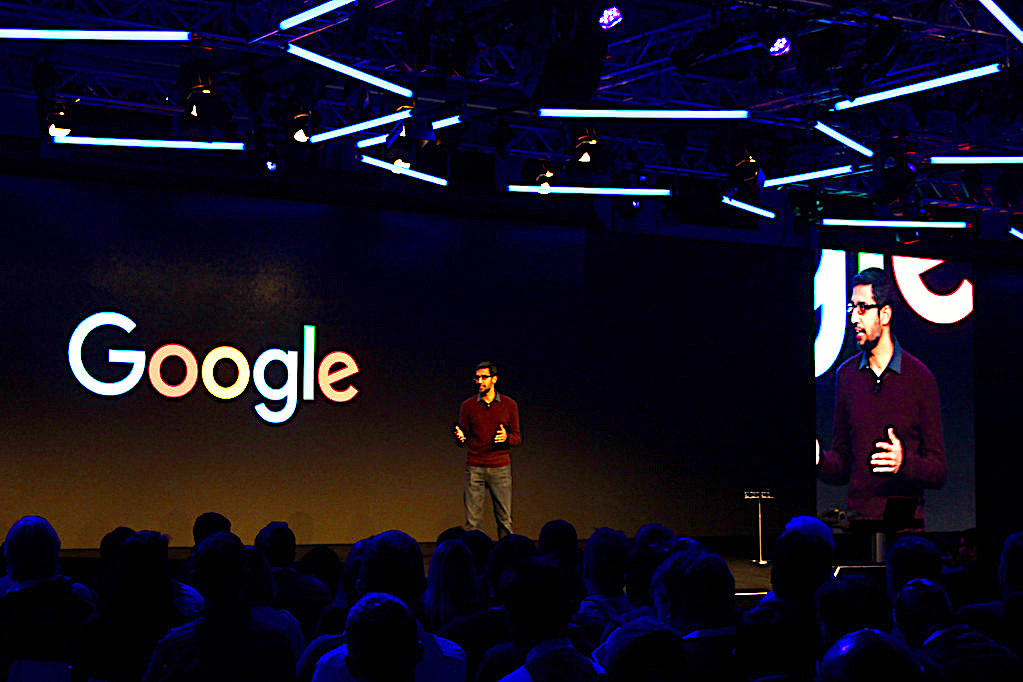With an eye on the layoffs underway in the tech sector, Sam Pizzigati says the most accomplished corporate thieves never fear indictment. They steal in broad daylight.

Server rack at Chicago Microsoft office, 2012. (Michael Kappel, Flickr, CC BY-NC 2.0)
By Sam Pizzigati
Inequality.org
![]() What makes for a thieving culture? An overabundance of pickpockets? Tsunamis of burglary and shoplifting?
What makes for a thieving culture? An overabundance of pickpockets? Tsunamis of burglary and shoplifting?
Most definitely not. To truly gauge a society’s larcenous leanings we need to look beyond the nimble-fingered and focus more on the smooth-talkers, the power-suited flimflammers who thrive in any society where significant numbers of people feel a driving need to get rich quick.
The most recent example? Federal prosecutors last month charged the crypto currency CEO phenom Sam Bankman-Fried with committing “one of the biggest financial frauds in American history.” The 30-year-old billionaire, the Securities and Exchange Commission (SEC) charges in a separate filing, built an immense financial empire on a “house of cards.”
The executive now trying to pick up those cards — the new CEO of Bankman-Fried’s FTX cryptocurrency exchange — says his predecessor simply engaged in “old-fashioned embezzlement,” not even stopping to bother with the “highly sophisticated” thieving of Enron’s fabled executive crooks a generation ago.
Right before Bankman-Fried’s brief appearance on America’s economic stage, the nation’s face of fraud belonged to Elizabeth Holmes, the founding CEO of the health-tech company Theranos.

Elizabeth Holmes, Theranos founder and CEO in November 2015. (Fortune Global Forum, Flickr, CC BY-NC-ND 2.0)
Holmes raised some $900 million from a “star-studded” list of investors who ranged from media mogul Rupert Murdoch to Henry Kissinger. Early in 2021, a federal jury convicted her of various frauds in what The Washington Post called “the most high-profile test of whether Silicon Valley’s ‘fake it until you make it’ ethos could withstand legal scrutiny.”
The hustles of our Bankman-Frieds and Elizabeth Holmeses can certainly make for entertaining reading. But Freya Berry, a veteran corporate fraud investigator, sees their scams “as not as unusual as you might think” — and not as entertaining either. With “rewards high” and “penalties higher,” she notes, corporate miscreants “go to great pains to conceal” their nefarious ways, even “making death threats to whistleblowers.”
Support CN’s
Winter Fund Drive!
We need these whistleblowers. We also need to understand that our thieving culture rests on more than the outright larceny of our indicted corporate crooks. Our most accomplished corporate thieves, in fact, never fear indictment.
They steal in broad daylight. They regularly steal livelihoods — from the thousands upon thousands of men and women who’ve worked ever so diligently, sometimes for many years, to make them fabulously rich.
We’re now living through an intense stretch of this theft. Tech’s top execs are now laying off workers at a fearsome rate. Earlier this month, Microsoft announced plans to pink-slip some 10,000 workers. Amazon is cutting 18,000, Google parent Alphabet 12,000, IBM nearly 4,000. Overall, estimates Forbes, tech firms had in January alone given the heave-ho to 56,000 employees.

Sundar Pichai, CEO of Alphabet, in 2016. (Daniel Cukier, Flickr, CC BY-ND 2.0)
What makes these layoffs “thefts?” Simple avarice. Investors on Wall Street “expected more growth,” explains Grid economics analyst Matthew Zeitlin, than Big Tech companies are currently showing. That has Big Tech share prices sinking, “and any time share prices fall, investors and executives get antsy — and workers often pay the price.”
Meanwhile, the antsy CEOs slashing all these jobs are continuing to stuff dollars into their own personal pockets, at overall pay rates that rarely dare drop below a quarter-million dollars a week.
This past October, Microsoft disclosed that Chief Executive Satya Nadella’s annual compensation had jumped 10.2 percent to just under $55 million. Nadella now makes more in one year than the typical Microsoft employee can make in 289 years. Back in 2018, the typical Microsoft worker only had to labor 154 years to earn what the company’s CEO made in just one.

Microsoft CEO Satya Nadella in 2017. (CC BY-SA 4.0, Wikimedia Commons)
This past December brought news that Alphabet CEO Sundar Pichai has a new three-year “performance” package that stands to award him $210 million.
Execs like these set a thieving tone for our entire society. Their grand fortunes don’t just make the rest of us feel ever poorer. They leave us ever more vulnerable to the con artists who promise shortcuts to jackpots.
And this larceny from our corporate world’s most “respected” chief executives supplies the con artists among us with rationalizations for their own scamming behaviors. The corporate big boys play their games, they tell themselves, we play ours.
Societies that let enormous wealth concentrate in the pockets of a few make all this inevitable. They nurture greed and grasping. They always have. They always will.
Sam Pizzigati co-edits Inequality.org. His latest books include The Case for a Maximum Wage and The Rich Don’t Always Win: The Forgotten Triumph over Plutocracy that Created the American Middle Class, 1900-1970. Twitter: @Too_Much_Online.
This article is from Inequality.org.
The views expressed are solely those of the author and may or may not reflect those of Consortium News.
Support CN’s
Winter Fund Drive!
Donate securely by credit card or check by clicking the red button:


This article, of Sam P.’s, right beside Joe’s on Robert Parry’s helps so much to center our understanding. Conscience matters. We can be taught. But example is still our best method. Terrific articles, and your integrity and skill in telling us all about this world, is your indispensible gift. May you thrive in the best of company with colleagues, exemplary in decency and love.
Where to start? Firstly all this theft is institutional and normalized. It doesn’t make any difference how the money is gotten, and/or just don’t get caught. It is all about money, banks use computers to monitor and add small fees for hundreds of “services”, a dollar here and there from millions of depositors add up to real money. Basically charge to store peoples money. They still gamble with our deposits.
The theft starts with the tax system. So many ways to avoid taxes, for those that have batteries of tax attorneys to take advantage.
A truly progressive tax system and a wealth tax would correct this madness. There would be no point in accumulating great wealth.
Presently the wealthy avoid taxes, the government borrows from the wealthy that untaxed money, then we additionally pay interest to the wealthy tor that same untaxed money. They increase their wealth exponentially. We all lose.
A rather good write-up by Pizzigati on corporate thiveing braced up by excellent comments by many others. Actually, capitalism has been robbed of its possible benigness by allowing its overwhelming rogues to dictate its ideological fate. Capitalism was supposed to create jobs and thereby help social uplifts even while enriching the entrepruneurial class who facilitate it but when it is hijacked to merely hoard unproductive wealth it stands thoroughly corrupted giving birth to and nurturing the parasitic elitist class that gradually yet imperceptibly bloats itself to doom !
What makes a thieving culture?
The lack of a cop patrolling the beat.
Ain’t “de-regulation” grand!
The US was built on theft of First Nations resources and the theft of black lives, hope, and genius. Theft was continued with indentured servants and toxic workplaces. This was no accident as the US was founded by the word’s worst thieves: the British
America has never been a democracy as the Constitution was designed to ignore everyone but rich, white males. US society has always been defined by greed, legal theft, racism, genocides, and lynch mobs. US citizens are so criminally witless they won’t support human rights by getting down on one knee. They would rather get down on both knees and beg.
Lactantius, (late 3rd century) (The Divine Institutes): “In order to enslave the many, the greedy began to appropriate and accumulate the necessities of life and keep them tightly closed up, so that they might keep these bounties for themselves. They did this not for humanity’s sake (which was not in them at all), but to rake up all things as products of their greed and avarice. In the name of justice they made unfair and unjust laws to sanction their thefts and avarice against the power of the multitude. In this way they availed as much by authority as by strength of arms or overt evil.”
“Corporations have been enthroned, and an era of corruption in high places will follow, and the money power of the country will endeavor to prolong its reign by working on the prejudices of the people until all wealth is aggregated in a few hands, and the republic is destroyed.” — Abraham Lincoln
“This past October, Microsoft disclosed that Chief Executive Satya Nadella’s annual compensation had jumped 10.2 percent to just under $55 million. Nadella now makes more in one year than the typical Microsoft employee can make in 289 years. Back in 2018, the typical Microsoft worker only had to labor 154 years to earn what the company’s CEO made in just one.”
This suggests that the “typical” Microsoft worker makes around $190,000 per year ($55,000,000 divided by 289). Is $190,000 the average income, however, or the median income?
In all or most societies there exists a continuum between practices regarded as *business* and those regarded as *crime*. Distinguishing the two involves problematic and nuanced judgments based on standards that are often though not always arbitrary.
Let us consider some distinctions. Western economies have a FIRE sector that extracts a large percentage of wealth while providing what amounts to smoke and mirrors with regards to services. So–medical insurance does not medicate or provide care, but it charges for these because most individuals cannot make financial arrangements for such things by ourselves. As part of its operating costs, these businesses pay politicians to retain injustices that render their businesses viable. A bit similarly, homebuyers typically pay twice for their residences: once to a prior owner, but again to a financial institution for the use of money. Both practices are extraordinarily damaging, far more so than any shoplifting problem and usually more than armed robbery, at least over the whole of the population. Yet both are considered legal, even sometimes respectable, despite their obvious psychopathic aspects.
Some drugs are called “medications” and sold in pharmacies. Others are not and are trafficked on the street. The difference is legal,, not pharmaceutical or medical: it need have no relationship to the medical impact of use. But street vendors and their clients risk jail sentences and often carry large amounts of cash. So illegal substances along with particular sorts of human trafficking become basic support for the organized crime that is actually regarded as clearly criminal.
Because of the nature of enforcement, these “clearly” criminal associations have a particularly close relationship to government, and particularly to shadow government. DEA and local enforcement keeps prices up on the street; CIA penetration of such organizations provides a relative impunity to the personnel of large purveyors who have complied with CIA requests. The business is criminal, regardless of who is or is not hurt, in the sense that the aspects of criminality and prohibition provide the majority of the opportunities for cash profit.
These businesses–both the narcos and the black ops folks and those on both payrolls–work extensively with and around the large financial institutions. I do not mean to suggest that the one hand always knows what the other is doing; people are often far more clever about keeping their own misdeeds secret than they are at perceiving or assessing the associated connections with their work. But clearly an economic ecosystem has evolved in which one man with a suit and another with a pistol are in symbiosis, regardless of whether they might know each other personally.
What causes all this? It is not new: the greater the hoard, the harder the security. The less equal the wealth and incomes, the greater the practical value of every bribe.
Also applies to the banking industry. here in Australia the State and Federal governments agreed to implement “competition policy. The private and government sectors all jumped onto it and since then wage theft has thrived and job losses have increased at the same time CEO incomes have increased to ridiculous heights and shareholder profits have also gone through the roof.
jack
Remember when Sears and Roebuck had the best distribution and marketing in America? It’s workers were eventually squashed and assets stripped by a series of “businessmen” who stole what they could by gutting the company. Now an updated model is rolling again; it’s called Amazon.
Thanks to Sam Pizzigati for this piece. I wish he’d gone further. By some measures, America stands among the world’s most notorious kleptocracies. Perhaps a future piece will spotlight this fact with data.
This makes your blood boil. We-the-people need to get organized. Right now it’s all gadflies — like you. We need a powerful voice. A movement is afoot. Any interest in that?
“What Makes a Thieving Culture”
Simple answer: thieving, immoral people who hope they won’t get caught.
Another answer: capitalism. When you think about it capitalism is all about exploiting resources, whether human or other. In exploiting them, they are purchased at the lowest possible prices and the resulting goods and services sold at the highest possible prices – to make the profit that goes to the shareholders and executives.
It is this tiny minority of shareholders and executives that this article is about – exploiting anything and everything to extract maximum benefit. When you look at the supply chain that makes up capitalist businesses, the behaviour involved is all bad. Use dirty and deceptive tactics to pay as little as possible for resources, and similar tactics to get the highest possible prices. Rarely is any of it ‘fair’ to suppliers, workers or customers. Only the stronger suppliers can negotiate ‘fair’ prices, but they too are in the business of exploitation.
How is it that a whole economic doctrine that encourages people’s worst behaviour is considered good? One that benefits so few at the expense of so many?
Looks like the capitalists sense the “beginning of the end” as it appears they are exploiting the theft at a blistering rate. The only ones considering it “good” are the wealthy of course.
Valerie,
Then the question becomes, ¿How do we stop this thieving?
…and the answer is: Apply the existing laws!
When the lawmakers and justices become the thieves, the lawless culture results.
Education of Citizens is the only exit — and the opposite is the action we see today.
It really is bizarre that so few control the majority. We need another storming of the Bastille. But as I repeatedly say, until such time there is no food on the shelves, people will do nothing significant. A hungry man is an angry man.
They were laying off the workers during the 1980s and 1990s to fatten up their own bank accounts and had no intention of making the companies like Sunbeam and GE great when it came to actually manufacturing things in America.